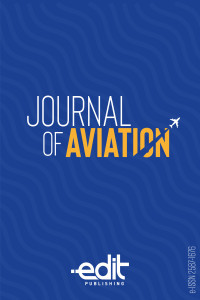Quadrotorlarda Diferansiyel ve Kollektif Morphing ile Yanal Kontrol
Quadrotor dört rotorlu insansız hava aracıdır(UAV). Bu araçlar askeri ve sivil alanlarda geniş bir şekilde kullanılır.
Pilotların yaşam risklerini ortadan kaldırdıkları için tercih edilirler. Bu çalışmada, insansız hava araçlarında yeni ve gelişimsel bir olgu olan morphing'in
etkisi yanal uçuş üzerine ele alınmıştır. Quadrotor modeli Newton Euler yaklaşımı kullanılarak elde edilmiştir. Quadrotor tam modeli ve morphing durumları Solidworks
programında çizilmiştir. Simülasyonlar modellerden elde edilen atalet momenti ve kütle değerleri ile MAtlab ortamında durum uzay modeli yaklaşımı kullanılarak yapılmıştır.
Oransal integral türev(PID) quadrotor kontrol algoritması olarak kullanılmıştır. Simülasyonlar her morphing durumu için ayrı ayrı yapılmıştır.
Sonuçlar grafikler ve tasarım performans kriterleri ile sunulmuştur.
Lateral Control with Differential and Collective Morphing in Quadrotors
Quadrotor are four-rotor unmanned aerial vehicles(UAV). These vehicles are widely used in military and civilian areas. They are preferred because they eliminate the risk of life of pilots. In this study, the effect of morphing, which is a new and developmental phenomenon in unmanned aerial vehicles, on lateral flight is discussed. Quadrotor modeling is achieved by Newton Euler approach. Models with quadrotor full and morphing states were drawn in Solidworks program. Simulations were made using the state space model approach in Matlab environment with the moment of inertia and mass values obtained in these models. Proportional integral derivative(PID) is used as the quadrotor control algorithm. Simulations are performed separately for each morphing situation. The results are presented with graphic and design performance criteria.
___
- [1] G. Barbaraci, “Modeling and control of a quadrotor with variable geometry arms,” J. Unmanned Veh. Syst., vol. 3, no. 2, pp. 35–57, 2015.
- [2] D. Falanga, E. Mueggler, M. Faessler, and D. Scaramuzza, “Aggressive quadrotor flight through narrow gaps with onboard sensing and computing using active vision,” Proc. - IEEE Int. Conf. Robot. Autom., pp. 5774–5781, 2017, doi: 10.1109/ICRA.2017.7989679.
- [3] V. Riviere, A. Manecy, S. Viollet, V. Riviere, A. Manecy, and S. Viollet, “Agile robotic fliers : a morphing based approach To cite this version : HAL Id : hal-01803737 Agile robotic iers : a morphing based approach,” 2018.
- [4] T. Oktay and S. Coban, “Simultaneous longitudinal and lateral flight control systems design for both passive and active morphing TUAVs,” Elektron. ir Elektrotechnika, vol. 23, no. 5, pp. 15–20, 2017, doi: 10.5755/j01.eie.23.5.19238.
- [5] O. and Kose and T. Oktay, “Optimal Tunning of PID Controller For Forward Flight of Research Based Quadrotor,” 2. Uluslararası Multidisipliner Çalışmaları Kongresi. Adana, 2018.
- [6] O. and Kose and T. Oktay, “Dynamic Modeling and Simulation of Quadrotor for Different Flight Conditions,” Eur. J. Sci. Technol., vol. 15, pp. 132–142, 2019.
- [7] O. Kose and T. Oktay, “Non Simultaneous Morphing System Desing for Quadrotors,” no. 16, pp. 577–588, 2019, doi: 10.31590/ejosat.569785.
- [8] T. Oktay and O. Kose, “The Effect of Collective Morphing on the Longitudinal Flight in Quadcopter,” MAS INTERNATIONAL EUROPEAN CONGRESSON MATHEMATICS, ENGINEERING, NATURAL ANDMEDICAL SCIENCES-III. Şanlıurfa, 2019.
- [9] T. Oktay and O. Kose, “The Effect of Collective Morphing on the Lateral Flight in Quadcopter,” Umteb6. UluslararasiMesleki ve Teknik Bilimler Kongresi. Iğdır, 2019.
- [10] T. Oktay and O. Kose, “Survey on Morphing Methods for Quadcopter,” Umteb6. UluslararasiMesleki Ve Teknik Bilimler Kongresi. Iğdır, 2019.
- [11] T. Oktay and O. Kose, “The Effect of Collective Morphing on the Vertical Flight in Quadcopter,” in MAS INTERNATIONAL EUROPEAN CONGRESSON MATHEMATICS, ENGINEERING, NATURAL ANDMEDICAL SCIENCES-III, 2019, pp. 1–10.
- [12] T. Oktay and O. Kose, “Non Simultaneous Morphing System Design for Yaw Motion in Quadrotors,” J. Aviat., vol. 3, no. 2, pp. 81–88, 2019.
- [13] A. Marks, J. F. Whidborne, and I. Yamamoto, “Control allocation for fault tolerant control of a VTOL octorotor,” Proc. 2012 UKACC Int. Conf. Control. Control 2012, no. September, pp. 357–362, 2012, doi: 10.1109/CONTROL.2012.6334656.
- [14] S. Bouabdallah, “Design and control of quadrotors with application to autonomous flying,” Epfl, 2007.
- [15] J. Domingues, “Quadrotor prototype,” Inst. Super. Tec. Univ. Tec. …, no. October, p. 129, 2009, [Online]. Available: http://scholar.google.com/scholar?hl=en&btnG=Search&q=intitle:Quadrotor+prototype#4.
- [16] K. J. Åström and T. Hägglund, Control PID avanzado. Pearson, Madrid, 2009.
- Yayın Aralığı: Yılda 3 Sayı
- Başlangıç: 2017
- Yayıncı: Vedat Veli ÇAY
